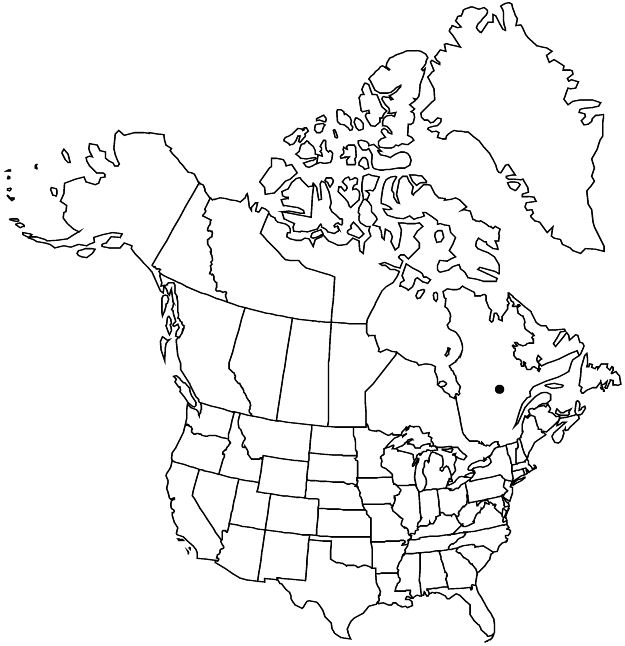Amelanchier gaspensis
Rhodora 33: 235. 1931.
Shrubs, 0.5–6 m. Stems 1–40, suckering and densely colonial. Leaves mostly unfolded; petiole (8–) 12.8–20.7 (–25) mm; blade broadly oblong to suborbiculate, (32–) 41–57 (–63) × (26–) 30–40 (–45) mm, base cordate or rounded, each margin with (0–) 3–9 (–12) teeth on proximal 1/2 and 3–5 teeth in distalmost cm, largest teeth more than 1 mm, apex rounded to subtruncate or short-pointed, abaxial surface moderately (sparsely or densely) hairy by flowering, surfaces sparsely hairy (or glabrous) later. Inflorescences (3–) 5–10 (–12) -flowered, (20–) 35–50 (–55) mm. Pedicels: 1 or 2 subtended by a leaf, proximalmost (9–) 12–19 (–26) mm. Flowers: sepals recurved after flowering, (2.6–) 3–4.5 (–5.9) mm; petals oblanceolate, (8–) 9.7–13.5 (–15) × (3–) 4.1–6.2 (–7) mm; stamens (17–) 18–20 (–21); styles (4 or) 5, (2.3–) 2.6–3.5 (–4.1) mm; ovary apex densely hairy. Pomes blackish purple, 10 mm diam. 2n = 4x.
Phenology: Flowering May–Jun; fruiting Jul–Sep.
Habitat: Calcareous shores, gravel beaches, cliffs, ledges, alluvial woods, roadsides
Elevation: 0–300 m
Discussion
K. M. Wiegand (1912) considered Amelanchier gaspensis to be perplexing because it varies much in stature and habit, as well as in leaf outline and dentition. The leaves suggest an intermediate condition between A. sanguinea and A. humilis, especially in the venation.
G. N. Jones (1946) considered the range of Amelanchier gaspensis to extend off the Gaspé Peninsula in Quebec and into Ontario and Michigan; he listed 13 specimens away from the Gaspé, and uncertainty exists about the identity of some of these specimens. For some specimens, Jones first annotated them as A. spicata and later changed his annotation to A. gaspensis. Wiegand annotated one of the specimens as “A. humilis x?,” another specimen as “A. humilis,” and another as “A. florida” (A. alnifolia var. semiintegrifolia). E. G. Voss (1972–1996, vol. 2) included A. gaspensis in A. sanguinea. M. L. Fernald (1950) reported A. gaspensis from northern Maine; specimens from there assigned to A. gaspensis do not match it in all respects. The occurrence of A. gaspensis away from the Gaspé remains questionable.
Selected References
None.
